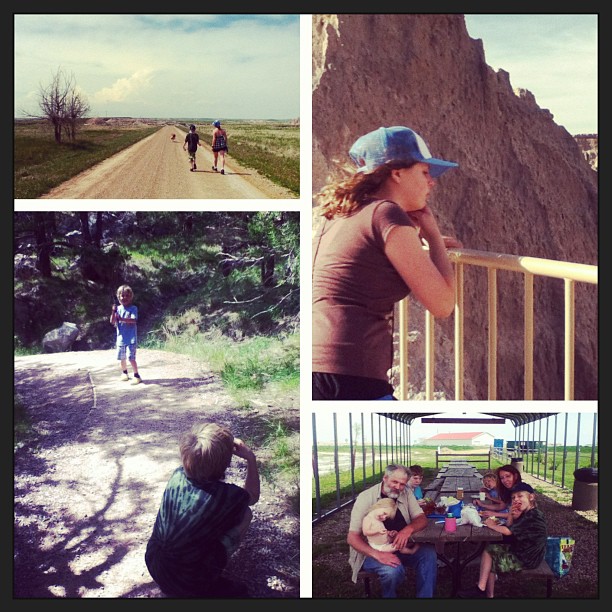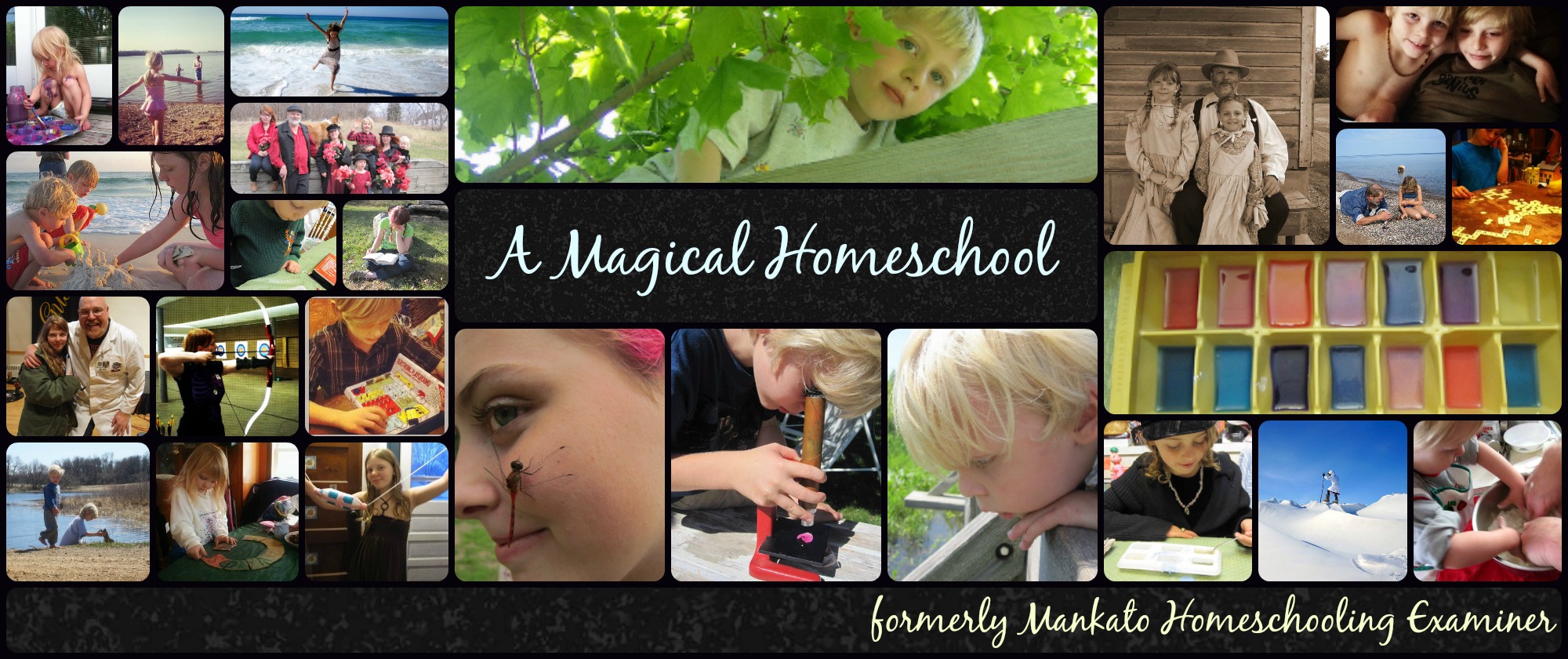
Our family just got back from a week out of state. We didn’t bring piles of textbooks or worksheets, but all five kids packed lots of learning into that week.
The kids managed to learn geography, presidents, American history, genealogy, civil rights, drivers’ education, physics, phonics, nutrition, genetic testing, ghosts, high school exams, art, photography, meteorology, time, cooking, fossils, hiking, zoology, mummies, reptiles, colors, spelling, reading, horses, Spanish, German, family history and lots more — all while having fun and spending time with family.
Below are nine simple ways to make sure the learning doesn’t stop when your family is traveling, plus our favorite resources to make it easy.
Stop and learn along the way
Be sure to allow travel time to stop and learn at the many educational opportunities you’ll pass along the way and once you get to your destination. These can be traditional stops such as historic markers and museums, or less conventional ones.
Some examples of educational stops we made during our week away from home last week include:
- We stopped to stretch at the Herbert Hoover museum, which included a restored little town area where we could see the actual (tiny!) cottage where one of our presidents was born. The visit was free and we looked up more information on President Hoover afterwards.
- At rest areas, we read maps, learned about invasive bugs (different ones were highlighted in different states), picked up travel brochures and read historic markers.
- We stopped to stretch at a tiny cemetery where we read the gravestones and talked about how the people likely died, especially noting the months and years that took entire groups of children. We wrote down those time periods to research now that we’re home.
- We have memberships to a zoo and a science museum that offer reciprocal free or reduced rates at other zoos and museums around the country, so we looked up which ones we’d be near on our trip. We found a fabulous children’s museum an hour from where we were staying, and took a day trip to see it one afternoon — for free.
- We made a pit stop at a park that was the site of one of the first fossil digs, getting some exercise and learning history and science.
There were many more, too, and these visits generally took a very small amount of time with a very large payoff.

Load up on educational apps
Load up on educational apps
If the kids are going to be stuck in the car or on a plane for long periods, this is the perfect time to download lots of great educational games and apps.
My teenaged daughters also really enjoy using the free Duolingo app to learn languages, and they both chose to do a lot of Spanish and German work on those during our trip.
We also have some educational apps that were not free but were well worth a small charge. I’ll feature a roundup of our favorite low-cost educational apps in this column soon.

Research your destination
Kids learn so much by visiting new places. It’s really worth the effort to make it even more educational by checking out books ahead of time and looking into the local history, science, literature, etc. of the area.
We always make sure to really learn about an area in all regards, not just in the dry facts and figures. For instance, while we were in Cincinnati I made sure the kids tasted iconic Cincinnati food like Skyline Chili. We try to learn about as many customs, legends and interesting parts of the area as we can.
It can also be fun to look up fiction books related to the area and read them together either before or after your trip.
Bring fun educational books
Stock up on a small pile of really fun educational books for the trip. Focus on those that are actually fun to read, like Basher books.
We own just about all of the Basher books, which cover subjects like the Periodic Table of Elements, weather, physics and grammar. Thanks to a sale at a book outlet site, I was able to nearly round out our collection just in time for this trip. The one on presidents was particularly helpful for us — a great combination of fun and educational, and just short enough. My sons also really enjoyed the dinosaur one on this trip.
There’s no need to buy your own set, though. Check them out from the library in time for your trip if you like, and then just take good care of them on the trip.
Also look for any other books that are catchy and interesting enough that your kids will reach for them on those long rides.
Play road games
Long car rides are the perfect time to play family games to work on everything from vocabulary to math.
One great resource is the book Carschooling, which was designed to provide hundreds of educational games and lesson plans for homeschoolers on the road.
Load up the Kindle
Kindles and the Kindle app make it so easy to bring a stack of books without having to actually lug the books.
Kids can check Kindle books out of the library to have a stash of great reading material, or they can also load up the Kindle with educational books.

Talk
Sometimes we get so caught up in our busy homeschooling lives that we miss out on long periods of time when we can just talk with our kids. Travel time can be a great way to catch up on that.
In our family, we take turns riding up front during long car rides. My teenage daughters get time to chat with their dad, which leads to conversations about everything from the visible light spectrum to driving laws to funny childhood memories. I can catch up with the younger kids in the back seat and we can talk about sights that we pass, questions they have, hobbies, you name it.
Make the most of the people you visit
Don’t forget that any family or friends that you visit will be able to teach your kids things that nobody else can (or can as well).
Grandparents can make history come alive with stories of actually living through wars, changes and time periods.
Family members can teach about their occupations, skills and interests.
Kids can learn family history, from Great Aunt Margie’s awesome potato soup (the secret is boiling the potatoes in broth) to what it was like for Grandma Franz to fight for civil rights in the 1950’s.
No textbook or curriculum can possibly compare.

Don’t stress about “doing school”
It really, truly doesn’t matter if your kids miss a week or two of typical studies. They will learn so much on your journey that it will more than make up for it. Don’t ruin it by trying to force “school time” in the middle of all of that.
Don’t ruin your homecoming week by trying to cram two or three weeks’ worth of school into one week trying to play catch-up, either.
I met one delightful homeschooling family at History Fest, a historic event that both of our families were taking part in. We were all spending the week teaching visitors about different parts of history as reenactors.
When I asked one of the children if he liked taking part in History Fest, he said yes, but he hated it too because they had to do double the work when they got back home. I smiled and said that I bet it was worth it, and he sadly shrugged and said, “Not really. We have to do fourteen workbook pages next week to make up for this.”
There are no workbook pages so important that every single one of them must be completed when our kids are taking part in such wonderful stuff. This child could have easily done every other problem on those pages, if they were truly so necessary.
Travels give our children so many educational experiences, not to mention magical memories and important time to connect with family. This is “school” in the best sense of the word.
***
Want to support our site?
Treat yourself to something on Amazon!
You deserve it, and it will help us out.
It’s a win-win! 😉
This site is an affiliate for Amazon.com. Purchases made through our links will earn us a small commission, at no extra charge to you.
***
This article originally appeared on examiner.com





